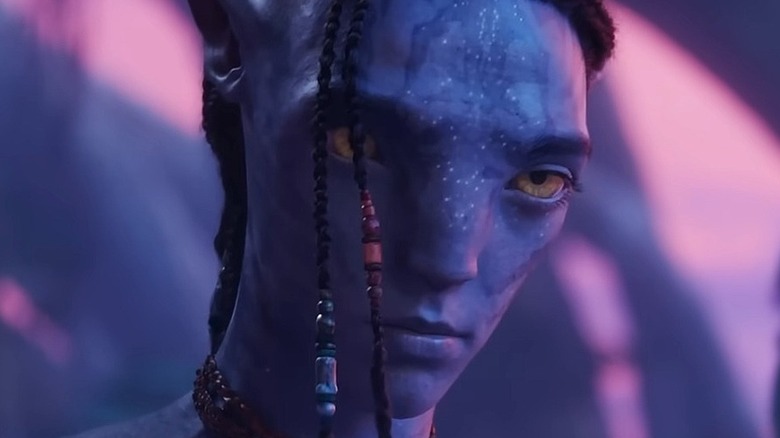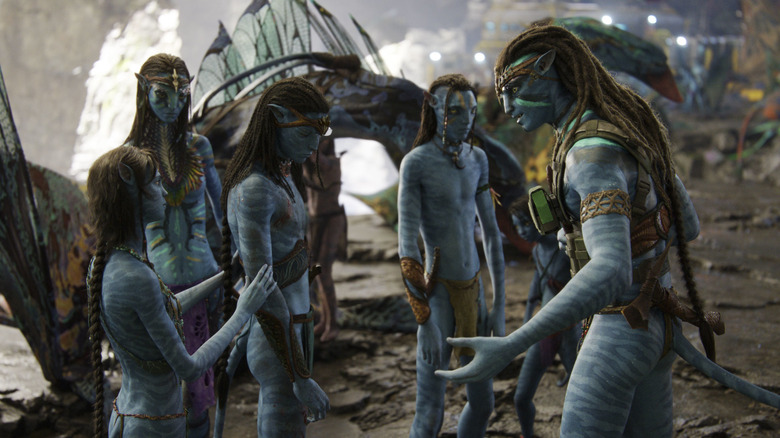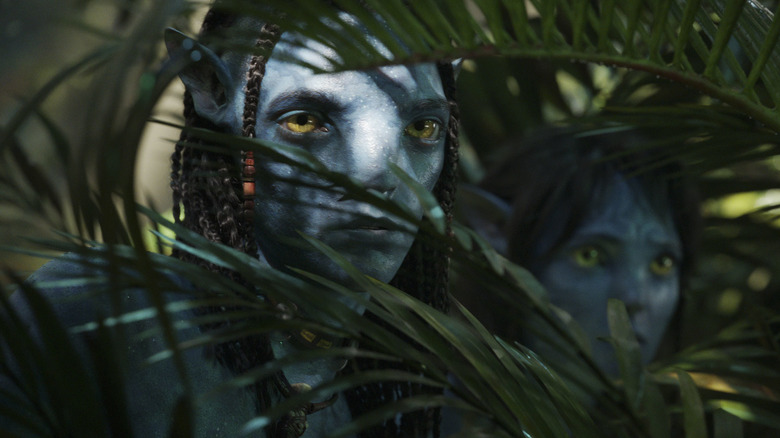Avatar 2 Fans Are Scratching Their Heads Over The Sully Kids' Accents
There are an endless array of challenges that come with creating an entire universe from the ground up, which is more than likely what plagued James Cameron when coming up with the ever-expanding world present in the "Avatar" franchise. The planet of Pandora was truly like nothing we had seen on the big screen, not only for its grand-scaled environments and collection of strange creatures, but also for its more nuanced details that helped breathe even more life into Cameron's computer-generated world. The customs, beliefs, and language of the Na'vi people, pulled from a combination of real-life cultures and science fiction stories (via Insider), imbued the motion-captured cast with a believable sense of their society that further immersed viewers back in 2009.
So when diving into the film's anticipated sequel "Avatar: The Way of Water," Cameron and company once again had an immense challenge on their hands to not only reintroduce the world of Pandora to audiences, but also to expand their world with the introduction of new corners of the ever-expanding fictional world. This includes the introduction of Jake Sully's (Sam Worthington) biological and adopted children, who, while a welcome addition to the franchise, do contain an aspect that has taken some fans out of the experience.
Their accents are not what they appear on the surface
"Avatar: The Way of Water" introduces audiences to Jake Sully and Neytiri's (Zoe Saldaña) biological children, Neteyam (James Flatters), Lo'ak (Britain Dalton) and Tuktirey (Trinity Jo-Li Bliss), and their adopted children Kiri (Sigourney Weaver) and Miles "Spider" Socorro (Jack Champion). Despite many of them struggling with their own issues, they still grow up learning the way of the Na'vi and embracing it as best they can. But fans who have sat through the three hour venture are leaving the film still confused as to why many of the kids have such different accents, despite growing up in the same conditions.
Redditor u/groooooogg began a thread, asking others who had just seen the James Cameron-directed epic, "My mom kept asking why the Sully children had accents...how do I explain it to her?" Others were quick to throw in their two cents, explaining that the accents we hear aren't necessarily what is being conveyed in the film itself. Redditor u/jenniferlorene3 explains that, "In the beginning Jake talks about how teaching his children to speak Na'vi made him learn the language and hear it as English. They have accents because they aren't speaking English. They're speaking Na'vi." Similarly, u/Stevev213 puts it into an audience perspective, saying, "They're all speaking Na'vi the whole. It just we hear it as English to make the movie easy." Regardless of what we hear, the family dynamic of "The Way of Water" was what mattered the most.
Way of Water asks questions about different family dynamics
While the varied collection of accents from Jake Sully's family in "Avatar: The Way of Water" might be confusing, there's a deeper meaning to it all. The film, taking place over a decade after the events of the first film, sees both Jake and Neytiri in a different place in their more carefree days. Having a family brings a whole new set of challenges for the accomplished warriors, a key theme that James Cameron wanted to tap into. As the director tells National News, "I was inspired by the fact that Zoe and Sam were parents, and I'm a parent of five, and we wanted to get into the family dynamics. You learn fear when you have kids ... And that's what both characters are dealing with."
And their children also have a lot to learn, who during the course of the film, learn more about who themselves and where they belong in the greater conflict of Pandora. "Way of Water" producer Jon Landau explains to ScreenRant that " ... at the center of these movies is the Sully family ... they're in a mixed race family. All of those dynamics, and how does that impact their kids? ... We have characters that we've spent time developing their stories that are teenagers. Struggling to find their own place in this world. What is their identity? How many teenagers are going through that?"


